- Comics
- Comics Reviews
- Manga
- Comics Reviews
- European Comics
- News
- Comics News
- Press Releases
- Columns
- Spotlight
- Digital Comics
- Webcomics
- Cult Favorite
- Back Issues
- Webcomics
- Movies
- Toys
- Store
- More
- About
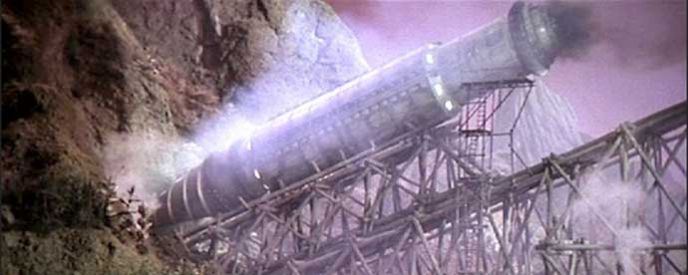
By Philip Schweier
September 23, 2014 - 14:00
With the release of the John Carter movie in
2012, I decided to revisit the Edgar Rice Burroughs books I read in my early
teens. This time out we examine the Pellucidar series, one of ERB’s most
popular creations. Because the stories were published in book form several
years after being published in magazine form, dates following titles reflect
the original publication dates.

Edgar Rice Burroughs
While Tarzan is certainly Edgar Rice Burroughs’ most famous creation, he is
also credited with creating a number of fantastic worlds, among them
Pellucidar, a land which exists with the earth. Imagine the earth is a hollow
ball, and on the inner side of the world is a land teeming with jungle, Inhabited
by prehistoric creatures, and an eternally noonday sun hanging in the center of
the sky.
The first of the Pellucidar books, At the Earth’s Core, was originally
published in All-Story Weekly in 1914. It tells the story of David Innes
and Prof. Abner Perry, who together create a drilling machine intended to
explore the interior of the earth. On its maiden voyage, the two pilots are
overcome by geological gases and the mole machine drills aimlessly before
emerging in the internal world of Pellucidar.
Here, they discover a world inhabited by prehistoric dinosaurs and cave
dwelling humans. Ruling over this world-within-a-world are the Mahars, a race
of airborne creatures similar to pterodactyls. To them, the humans are merely a
food source. With the help of Innes and Perry’s outer world technology, the
humans are able overthrow their reptilian masters.
In true Burroughs-like fashion, David Innes befriends a beautiful heroine named
Dian, and by the end of the story they have fallen in love, though throughout
the story each has at one point or another angrily denied his or her feelings
for the other. The story ends with the hero and his beloved – David Innes and
Dian, the beautiful cave girl – separated, with the hope for a reunion in the
eventual sequel.
Pellucidar (1915) returns Innes to the inner world, where he
rescues Dian from Hooja the Sly One. With Abner Perry, Innes is able to build a
confederate of humans, establishing a new human civilization in place of the
Mahars, with himself as a benevolent emperor.
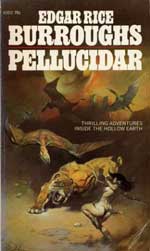
In the years to come, ERB would focus his energies on the much more popular
Tarzan series, and would not revisit Pellucidar for more than a decade. Even
then, the series is not beholden to a single hero, as Innes is merely a
supporting character. Instead, other characters are introduced and take center
stage in subsequent stories.
Tanar of Pellucidar (1929), follows the adventures of
a primitive resident of his mythical world. By this time, Innes has forged a
mighty empire, bringing together many of the fractured tribes and clans of the primeval
land. But a new menace, as troublesome as the Mahars, has grown. They are a
fierce people called Korsars, and seem to be the descendants of 16th century
pirates. Innes is captured, and at the end of the story, Jason Gridley, who has
been transcribing the tale via radio waves from Pellucidar, vows to rescue him.
The next book may be the earliest example of fictional characters inhabiting a
shared universe, and the first crossover of those characters. Tarzan at the
Earth’s Core is the fourth in the Pellucidar series and the 13th published
Tarzan adventure. Gridley seeks out Tarzan, and together they commission a
dirigible to take them to the immense opening at the North Pole that leads to
Pellucidar.
The crossover ends with von Horst, a member of Tarzan’s
expedition, unaccounted for. His story is featured in the next volume in the
Pellucidar series, Back to the Stone Age (1937). Like many of Burroughs’
heroes, he meets a girl, the daughter of a chief, and together they seek to
escape people who would seek to destroy or enslave them both, all the time
neither admitting their growing affection for one another.
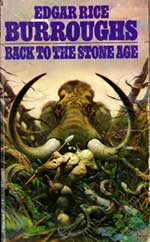
Land of Terror followed five years later, and returns the focus to David
Innes in a series of short adventures following Back to the Stone Age.
The final book, Savage Pellucidar, followed the same format. Burroughs
died in 1950, and it was published in 1963, perhaps cobbled together from a
number of incomplete narratives. It also features a plot device common to
Burroughs’ novels. The Hero goes off in search of adventure, only to be met
with misfortune and seemingly lost. His Mate – Jane, Dian, Dejah Thoris or
Duare – goes in search of him, only to have The Hero return home. Finding His
Mate gone, he journeys into danger once more to find her. Both suffer a number
of near-death experiences and near misses before eventually being reunited at
the end of the story.
In 1976, the Burroughs estate authorized the publication of Mahars
of Pellucidar, a new novel by John Eric Holmes. Another man from the outer
world, Christopher West, using a newly-invented transportation beam, witnesses
the sacrifice of a young girl to the Mahars. West spontaneously gathers a red
fire axe and teleports to Pellucidar, determined to save her. The story is set
in a region of the interior world where the mahars are still dominant. As such,
none of ERB’s original characters are featured. Despite the Burroughs estate’s
initial approval, a sequel entitled Red Axe of Pellucidar was written,
but its publication was blocked. Eventually, a private edition was published in
1993, according to Wikipedia.
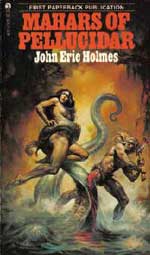
Coinciding with the release of Mahars of Pellucidar, a feature film of At
the Earth’s Core was released starring Doug Maclure and Peter Cushing as
Innes and Perry, respectively. It’s production values were typical for its day,
the prehistoric creatures created using people in rubber costumes stomping
their way through miniature rain forests. Pellucidar was also featured in the
syndicated television series, Tarzan: The Epic Adventures.
In comics, Pellucidar was featured in the first seven issues of the
10-issue run of Weird Worlds, a DC title from the early 1970s. A few
years later, writer/artist Mike Grell re-worked the inner world concept for his
Warlord series, adding elements of sword & sorcery.
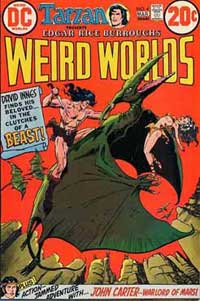
As a whole, the Pellucidar series can be described as a travelogue, as
adventurers from the outer world encounter any number of races and primitive
cultures. Burroughs was very adept at creating unique creatures, both sentient
and otherwise, to inhabit his fictional worlds. The action is crisp, though in
some instances, the writer resorts to descriptions of conversations, rather
than dialogue itself. For the most part, it is pure pulp escapism and nothing
more.
Last week: John
Carter of Mars
Next
week: Tarzan, Lord of the Jungle